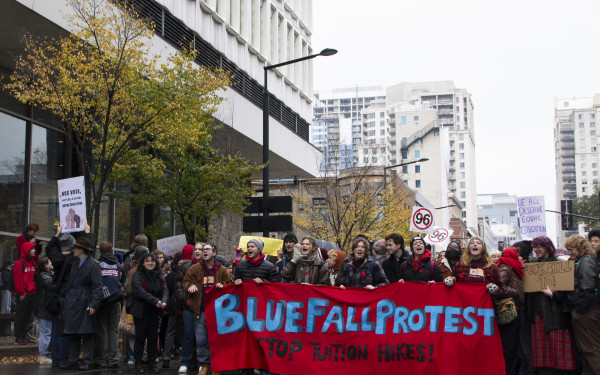A Response to Concordia President Alan Shepard
The Need for a Wider Debate on Universities’ Missions and the Costs of Higher Education
Concordia president Alan Shepard recently wrote a piece for The Globe and Mail titled “Let’s look at Quebec tuition fees–and create opportunities for all.”
Great title! I agree, let’s look at tuition fees and create opportunities for all.
In the piece, Shepard suggests that the debate on higher education in Quebec is centred on two issues. The first is “opposition by some to increasing what have long been the lowest tuition fees in Canada.” The second is “the tough state of Quebec’s finances after a global recession.” I disagree on this diminished assessment.
While it may be true that the media narrowed the issues to as few variables as possible, the debate has always been both historical and complex. Quebecers believe that education is a right; that it should be well funded by the government; and that all efforts should be made to make higher education freely accessible to everyone.
These are not ideas that are just held by “some.” These are deeply cherished values, embraced and practiced in Quebec since the Parent Commission first published its report in the 1960s.
Quebecers do not want to return to a time like the one before the Parent Commission—when education was managed by the church and when only a small elite class could attend university.
Many of the students who protested last spring and summer were the children of Quebecers who were the first in their families to attend and benefit from higher education.
It hasn’t been that long since the days of the Parent Commission. People, especially women and mothers, noticed how their CEGEP and/or university attendance had opened doors for them and their families. This notion of the value of post-secondary education continues to be passed on to their children to this day.
When the provincial Liberal government of then-premier Jean Charest decided to significantly increase tuition over five years, while at the same time diminishing government funding to higher education, the plan was deemed unacceptable to these students and their families.
They saw through the government’s plans: the tuition fee increases would not resolve the main problem that the government used to justify them, because the government would continue to decrease funding to post-secondary education.
The media response was fierce, at times painting the striking students as spoiled brats and even going as far as equating them to “terrorists.” Those characterizations were meant to discredit an otherwise very credible and peaceful movement.
People needed to ask themselves why is it that in Quebec, there has been so much opposition to the Liberal government’s plan to increase tuition. Surely, the 400,000 people that became politicized can’t all be spoiled brats? And surely 400,000 people cannot be characterized as just “some” people?
Like many others before him, Shepard, too, reminds us that Quebec has the lowest tuition fees in all of Canada. Well, we have the lowest tuition fees for a reason. I hope that I can begin to shed some light on this complex issue.
Shepard concludes, “The summit [on higher education] should not get stuck in the push and pull of tuition fees. It should not be the end of the rethink on higher education, but the beginning of a reset.”
I agree with him on two points: that the government is wrong to cut funding to universities, and that the summit held on Feb. 25 and Feb. 26 needed to go beyond the tuition fee debate.
However, Shepard’s support for “differential fees” as a quick solution to rising costs is worrisome. A decision to employ such measures transforms an “education [that] serves the interest of all” to a consumer-based project in which a degree becomes a personal investment for a future career.
Since the Parent Commission, Quebec universities were transformed for the collective good with the agreed-upon purpose that they would benefit the whole of society—not just those who actually studied there. It is costly, for example, to educate a physician, but the benefits to society are great.
“The media response was fierce, at times painting the striking students as spoiled brats and even going as far as equating them to ‘terrorists.’ Those characterizations were meant to discredit an otherwise very credible and peaceful movement.”
But when Shepard suggests that “[tuition fees] could be balanced upward to reflect higher potential earnings for graduates of disciplines such as medicine and law, or downward to account for lower prospective earnings in other disciplines,” the idea of the collective good is diminished.
It comes as no surprise to us that Shepard offers differential fees as a “solution.” It follows the market model where the individual pays for the education they can afford.
It might be suggested that bursaries, scholarships and other grants can be made available for those students who cannot afford university, but let’s be honest: grants and scholarships are great for those who get them, but not everyone who applies is accepted. In other words, they are not available to all.
Scholarships and bursaries are not a synonym for free education. This is our concern. Is it fair to admit students on the basis of their economic capacity? Differential fees seriously impede access to education for all.
I believe that the role of university revolves around learning, teaching, academic scholarship and research. It’s also about providing an education that gives students both a broad critical understanding of the complex world as well as in-depth intellectual development in their subject area.
I see the role of higher education as supporting students—primarily as citizens who contribute to society in ways that go beyond simply joining the labour force.
Right now, universities are concerned with being competitive on the world stage by increasing their rankings through “innovative” research and providing high-valued labour to the economy.
The market model in universities orients teaching, learning and research to market trends when universities should actually be taking leadership and shaping the standards of the market.
We cannot let the market decide, because the common good is antithetical to its very nature. You wouldn’t ask a fox to be the gatekeeper of chickens. Who is left to care for the common good if not the university?
For example, universities should be able to say no to technological changes that do not respect society or the environment, even when markets pressure the institution to do this.
Universities should shape—rather than be shaped by—the market. Under these conditions, we can preserve academic freedom. It seems that the Quebec social crisis last year brought to the surface ideological disagreement about the fundamental aims of education.
Thus, it is fair to use the Summit on Higher Education to pose the all-important question: what are the fundamental goals of universities? Only then can we discuss the means that could be deployed to achieve the university’s mission, a mission reflected and decided upon through a concerted effort in a society.
There is a great deal of scholarship on and about higher education in Quebec, Canada and internationally that could be drawn upon to inform and deepen this reflection. We wonder why it is that higher education thinkers have not been invited to the summit discussion.
Their absence is sorely lacking in an important public forum that is bringing together university administrators, politicians and economists.
I call upon the scholars who are not already involved to get involved, to unravel the complexities of higher education and to create a clear vision.
If the Summit on Higher Education is simply a chat about prices, then a reflection on the role of higher education has already been eaten by the fox.

_900_600_90.jpg)


(WEB)_600_375_90_s_c1.jpeg)


4_600_375_90_s_c1.jpg)